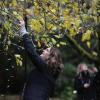August 31, 1999 - 5:00pm
Concerns about the environment and personal safety have sparked an exciting new initiative at Malaspina University-College to create a greener, safer campus.
A Committee of students and staff is working together to develop a comprehensive transportation plan for the institution.
"We need to take immediate action to reduce the number of cars traveling to and from campus," says Committee Chair Rick Heikkila. "Each day, some 2,800 cars - mostly single occupancy vehicles - cram into overcrowded parking lots on the Nanaimo campus. Government funding to build new parking lots has run out. As the campus grows, parking problems, congestion and pollution caused by cars will continue to get worse."
The Committee’s goal is to reduce the number of cars traveling to and from campus by 25 percent within the next five years.
Heikkila says the Committee believes that one of the most direct ways to change the travel behaviour of students and staff is to reduce the dependency on cars and to provide feasible transportation alternatives. The most obvious way to fund this would be to implement pay parking on the Nanaimo campus by May 2000.
The Committee is adamant that net revenues from pay parking be placed into an "Environmental Trust" and not into Malaspina’s general operating budget, he says.
"The Environmental Trust would be used to achieve the Committee’s objective of creating a greener, safer campus," says Heikkila.
For instance, funds would be used to promote alternate modes of transportation to and from campus such as walking, car/van pooling, ride-share programs or improved transit.
Net revenues from parking fee levies would be used to provide walkers and cyclists with better facilities, such as showers, bike racks and lockers. Personal safety and security would be improved by installing more pay phones and improved lighting on campus.
Heikkila says the Committee is committed to working with B.C. Transit to explore opportunities for improved bus service and park and ride initiatives. Discussions are also underway with the Jack Bell Foundation regarding car/van pooling programs, and with other community and provincial agencies to explore ways to encourage use of alternative modes of transportation and reduce dependency on cars.
"An important part of the process is to seek input from the entire university-college community," says Heikkila. "Feedback from staff and students will be taken into consideration as we continue to develop a comprehensive transportation plan for the institution."
Committee members include Chair Rick Heikkila as the support staff representative; students Daniel Perkins and Theresa Sabourin; faculty members Brad Reimer and Stu Seifert; physical plant director Dave Wadeson; Board member Peter McCue; and Vice-President of Administration & Bursar Edwin Deas.
For more information about the Transportation and Safety Management Initiative, please contact Marianne van Toor, Director, Media Relations at 740-6341.
Tags: In the Community






